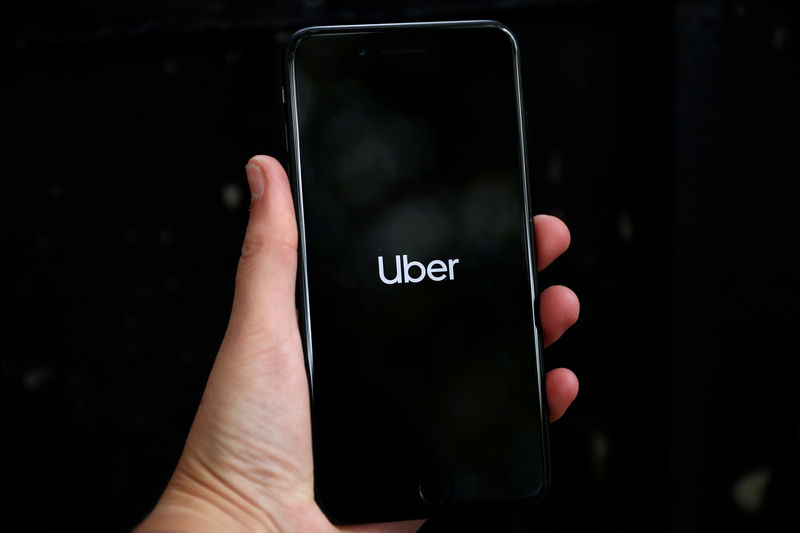By Joshua Franklin and Heather Somerville
(Reuters) - Ride-hailing company Uber Technologies (NYSE:UBER) Inc will unveil terms for its initial public offering on Friday, telling investors it will seek to be valued at between $80 billion and $90 billion, according to people familiar with the matter.
The valuation sought is less than the $120 billion valuation that investment bankers told Uber last year it could fetch, and closer to the $76 billion valuation it attained in its last private fundraising round last year.
Uber's moderation of valuation expectations reflects the poor stock performance of its smaller rival Lyft Inc (NASDAQ:LYFT) following its IPO last month. Lyft shares ended trading on Thursday down 22 percent from their IPO price amid investor skepticism over its path to profitability.
Uber will unveil on Friday an IPO price range of between $44 and $50 per share, based on which it would raise between $8 billion and $9 billion, the sources said. This would rank it as the largest IPO since that of Chinese e-commerce giant Alibaba (NYSE:BABA) Group Holding Ltd in 2014.
In addition, some Uber insiders will also sell their own shares in the IPO, the sources said. Reuters reported earlier this month that the combined value of Uber shares sold in the IPO could be around $10 billion.
Uber also plans to unveil on Friday its last sale of stock as a private company. PayPal Holdings Inc (NASDAQ:PYPL) plans to invest $500 million in a concurrent private placement at Uber's IPO price, a person familiar with the matter told Reuters. The deal includes a partnership to expand PayPal as a payment option for Uber rides to most of the 70-plus countries where Uber operates.
The PayPal investment was first reported by the Wall Street Journal.
In addition, Uber and PayPal will collaborate on digital payment solutions, including the expansion of Uber's digital wallet such that customers could, for instance, use it for purchases other of an Uber ride, the person said.
The development of a more robust digital payments service could accelerate Uber's ambitions to become a "superapp" for a variety of logistics and transportation services, and give the company more opportunities in underbanked regions such as Latin America.
Southeast Asia's ride-hailing company Grab, for example, has built out a line of financial services, including loans and insurance, to accelerate its growth in the region.
PayPal's investment and collaboration are contingent upon Uber completing its IPO.
The investor roadshow will kick off in earnest on Monday, setting the stage for Uber to debut on the New York Stock Exchange in early May.
For the roadshow, Uber's top executives will travel the Unites States and make a stop in London to drum up investor interest in the IPO, sources said.
The sources asked not to be identified because the matter is confidential. Uber declined to comment. The price range was reported earlier by Bloomberg News.
Two other IPOs this month, those of online scrapbook company Pinterest (NYSE:PINS) Inc and video conferencing company Zoom Video Communications Inc, have performed much better than Lyft. Uber, however, has chosen to still value itself conservatively.
"People are more cautious than they were 4 weeks ago," said Duncan Davidson, general partner at Bullpen Capital, an early-stage venture capital investment firm.
In addition to ride hailing, Uber's business includes bike and scooter rentals, freight hauling, food delivery and an expensive self-driving car division.
The ride-hailing company has disclosed it has 91 million users, but growth is slowing and it may never make a profit. Uber in 2018 had $11.3 billion in revenue, up around 42 percent over 2017, but below the 106 percent growth the prior year.
During the IPO roadshow, Uber's chief executive, Dara Khosrowshahi, will be tasked with convincing investors that he has successfully changed the company's culture and business practices after a series of embarrassing scandals over the last two years.
Those have included sexual harassment allegations, a massive data breach that was concealed from regulators, use of illicit software to evade authorities and allegations of bribery overseas.
Uber is reserving some shares in the IPO for some of its most active and best-performing drivers, including those who have completed at least 2,500 trips.
SCALING THE BUSINESS
Last week, Uber's autonomous vehicle unit raised $1 billion privately from a consortium of investors, including top Uber shareholder SoftBank Group Corp, allowing it to transfer some of the substantial cost of developing self-driving cars onto outside investors and appease some Wall Street concerns over spending.
One advantage Uber will likely seek to play up to investors is that it is the largest player in many of the markets in which it operates. Analysts consider building scale crucial for Uber's business model to become profitable.
Lyft, which was valued at $24.3 billion in its IPO, has focused only in the U.S. and Canadian markets.

"Investors are now asking for more clarity on how ride-sharing companies will monetize data they are collecting and if this is a scalable business," said Jordan Stuart, a client portfolio manager for Federated Kaufmann funds who often purchases stock in IPOs.